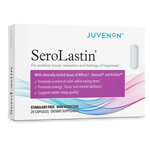
Curious about how fat cells affect your health? Find out what they do to your body and how they can impact inflammation levels.
In this article:
A Status Symbol Becoming Epidemic
Is “Overweight” Over-emphasized?
What Are Fat Cells?
Fat Cell Regulation
What Happens to Fat Cells When You Lose Weight?
Redefining a Balanced Diet
Inflammation Can Lead to Insulin Resistance and Type II Diabetes
How to Eat Healthily to Avoid Gaining Excess Body Fat
How Fat Cells Affect Bodily Inflammation
A Status Symbol Becoming Epidemic
Before the industrial-agricultural revolution (about 150 years ago), food was relatively scarce and, consequently, expensive. Obesity was often associated with the privileged (hence the term “fat cat”), who could afford to eat well and do little else.
Today, advanced technology and mass production are making foods relatively inexpensive and readily available. The fast-food industry alone offers incredibly low prices (dollar meals) at over 500,000 restaurants across the United States.
But, the menus tend to be fat-, carbohydrate-, and sugar-heavy, probably contributing to an alarming shift in overweight statistics.
“The latest estimates indicate that about 30-40% of Americans are overweight.”
What was once considered a status symbol is now an epidemic, plaguing this country and other industrialized nations. The latest estimates indicate that about 30-40% of Americans are overweight and many (20-30%) fall into the class of ‘obese’ (BMI >30).
At the current upward trend, it is estimated that 75% of the people in the U.S. will be overweight by 2015.
Is “Overweight” Over-Emphasized?

Why is America’s weight problem worthy of our attention? Unfortunately, studies are indicating that excess weight is associated with numerous health conditions, most notably, diabetes and atherosclerosis.
If an overweight America is an unhealthy America, we may also be looking at a contributing factor to the high cost of healthcare.
So, why doesn’t America simply return to eating less and exercising more? For some, food may have become an addiction, making it as difficult to “kick” as a dependence on any drug.
Others may not believe there is a connection between being overweight and not being well because their doctors have been unable to explain exactly how a weight problem becomes toxic.
“A recent study showed how excess fat interferes with regulators of the body’s metabolism.”
New information may help change their minds. A recent study demonstrated how excess fat, like belly fat, interferes with regulators of the body’s metabolism.
It also provided strong evidence to support a cause/effect relationship between excess fat in cells (bloated fat cells) and conditions like diabetes and atherosclerosis.
What Are Fat Cells?
Fat cells aren’t all bad, however. Actually, they’re important to our health.
One fat cell function is serving as reservoirs of energy molecules, triglycerides, to be tapped for running our cellular machinery in times of high energy demand.
Far from simply being storage “couch potatoes,” they are also actively involved in synthesizing and secreting an array of hormones. In fact, adipose cells comprise the body’s largest endocrine organ.
The fat-cell-secreted hormones bind to specific receptors on themselves (autocrine secretion), as well as to receptors on adjacent inflammatory cells, macrophages (paracrine secretion), which normally infiltrate fatty (adipose) tissue. For some time, scientists have been aware that the more fat a fat cell contains, the more active it is in paracrine secretion.
Correspondingly, the higher the fat content of fat tissue, the more macrophages (inflammatory cells) take up residence there.
“Excess fat seems to activate the fat cells to produce hormones that trigger inflammation.”
Once activated, macrophages, in turn, secrete additional hormones, cytokines (TNF alpha, IL-6, etc.), which stimulate the immune system, triggering an inflammatory reaction that can adversely affect tissues throughout the body.
(Aside: Why the immune system has an affinity for fatty tissue in modern man and whether this association serves a positive health purpose are unanswered questions. Some speculate that fatty tissue is an evolutionary remnant of an organ with multiple functions, such as digestion as well as immunity.)
The harmful effects can range from interference with insulin signaling to the development of type II diabetes. In other words, excess fat seems to activate the number of fat cells to produce hormones that trigger inflammation and, ultimately, disease.
Fat Cell Regulation

The previously mentioned study revealed more about fat cells and inflammation, specifically two new hormones that are involved: an anti-inflammatory hormone, Sfrp5, and a pro-inflammatory hormone, Wnt5. Under normal conditions with a non-bloated, normal-size fat cell, there is a balance between these hormones.
They neutralize each other.
“A ‘balanced diet’ takes on a whole new meaning: a fat-cell-regulating balance.”
The research shows how excess fat in a cell (bloated fat cell) upsets a key regulatory mechanism, triggering the fat cell to produce too little Sfrp5 and too much Wnt5. This imbalance allows the inflammatory hormone to bind to a receptor that activates an enzyme, JNK1, leading to the inactivation of the insulin receptor.
The resulting decrease in insulin sensitivity, known as insulin resistance, is the precursor to type II diabetes.
Insulin Resistance Definition: A condition wherein cells start to ignore signals from insulin, which can lead to type II diabetes
What Happens to Fat Cells When You Lose Weight?
Fat cells are like sponges. They try to store stuff like fat, vitamins, hormones, and toxins until your body needs whatever these cells keep.
When obese people start to lose weight, their fat cells start to shrink, releasing other fats and lipids in their blood. These substances break down and become smaller molecules which you can release through breath and urine.
But, if you go back to overeating or consuming more calories than what your body needs, your fat cell size will always expand to its normal size and will then become larger.
Redefining a Balanced Diet

Based on these new findings, the “balanced diet,” nutritionists and physicians have always recommended takes on a whole new meaning. It seems that fat-cell-regulating balance is another benefit of eating a lower fat diet of vegetables, fruits, whole grains, legumes, fish, and lean meat.
Consuming foods which cause the pancreas to be jolted into producing large quantities (spikes) of insulin, stimulating appetite, and promoting fat synthesis may lead to the imbalance between Sfrp5 and Wnt5, which, as demonstrated by the researchers, results in inflammation and, potentially, disease.
Inflammation Can Lead to Insulin Resistance and Type II Diabetes
A number of laboratories have demonstrated that inflammatory cytokines, produced in adipose (fatty) tissue, are at least partly responsible for initiating events leading to insulin resistance and, consequently, type II diabetes. But, the precise mechanisms involved in obesity-induced insulin resistance have been unclear until recently.
A team of investigators from universities in America, Japan, and Singapore has linked a new cellular signaling pathway, the Wnt pathway, with the regulation of both adipose tissue-resident macrophages and adipocytes with respect to the secretion of inflammatory and anti-inflammatory proteins involved in insulin insensitivity. The researchers reported their findings as “Sfrp5 Is an Anti-Inflammatory Adipokine That Modulates Metabolic Dysfunction in Obesity” in Science magazine.
The investigators observed a significant increase in levels of an inflammatory hormone, produced by the adipocyte Wnt5a, in mice fed with a high-fat, high-sucrose diet (a diet believed to lead to type II diabetes). Wnt5a (known as a fizzle protein) was shown to bind to a receptor, termed “fizzled,” which in turn activates the enzyme JNK1, a kinase that phosphorylates and inactivates the insulin receptor substrate.
The consequence of this pathway is insulin insensitivity and secretion of inflammatory cytokines from resident macrophages.
In contrast, the team noted low levels of Wnt protein in mice fed with a normal diet under normal conditions. Additionally, in this group of mice, another protein was secreted by the adipocytes.
Known as secreted fizzle-related protein5 (Sfrp5), it binds to fizzle protein Wnt5a and neutralizes its action (can no longer bind to the fizzle receptor and activate JNK1). These mice did not develop insulin resistance.
This research implies that, to sustain normal insulin function in adipocytes (possibly in other insulin target tissues like muscle and liver as well), it is important to maintain a balance of pro-inflammatory and anti-inflammatory factors, Wnt5a and Sfrp5, respectively. A diet that encourages excess fat deposition results in over-filled fat cells which are triggered to produce excess pro-inflammatory hormone, Wnt5a, and reduce the synthesis of the anti-inflammatory hormone, Sfrp5.
This imbalance favors inflammation and insulin insensitivity, which may ultimately lead to type II diabetes.
How to Eat Healthily to Avoid Gaining Excess Body Fat

Although a change in your diet is important to keep a fat-cell-regulating balance, it is also crucial to understand that changing your eating habits plays an important role in keeping a healthy weight and eventually preventing excess fat. Here are a few healthy eating habits you can follow:
1. Minimize Sugar Intake
Sugar is the primary reason why a lot of people gain weight. It is a form of carbs which eventually turns into fat in your body.
It affects blood sugar and insulin levels which can spike hunger, making you crave for more high-carb or sugary foods. You can simply avoid eating processed foods as they are high in sugar and always check the labels for sugar content.
2. Store Healthy Foods at Home
One of the causes of people becoming overweight is that unhealthy foods are readily available everywhere. So, when people are traveling or do not have healthy foods stored in their homes anymore, they tend to go to the nearest food store and buy goods, which are mostly unhealthy items.
To avoid this scenario, always include healthy foods like fruits and vegetables on your grocery list and keep them in your fridge. You can even create your own garden, so you can make sure you’re eating mostly plant-based foods.
3. Consume More Fish in Your Diet
Fish is popular for being a great source of nutrients, especially the omega-3 fatty acid. This fatty acid, for example, plays a crucial role in managing and preventing heart disease.
You can roast, bake, grill, or broil fish like salmon, herring, and mackerel because these cooking processes don’t add extra fat. Frying or breading fish can add fat and calories.
4. Don’t Forget About Counting Nutrients
Although it is important to count calories in your diet, being mindful of the nutrients you consume is also essential if you want a high-quality weight loss diet. The quality of the calories you take creates a greater impact on your health than the quantity.
Make sure you know the nutrients you get from the ingredients you use in cooking your dishes. Always know as well as to how much is too much and how little is too little so you can ensure you take the right amount of nutrients for your body.
With the knowledge about how fat cells affect your health, you know the value of keeping a healthy weight and avoiding excess body weight. You can always start with your diet to get the right nutrients you need for your body and try to switch to a much healthier lifestyle to stay healthy and fit.
This Research Update column highlights articles related to recent scientific inquiry into the process of human aging. It is not intended to promote any specific ingredient, regimen, or use and should not be construed as evidence of the safety, effectiveness, or intended uses of the Juvenon product. The Juvenon label should be consulted for intended uses and appropriate directions for use of the product.
Dr.Treadwell answers your questions.
Question: If your cells die every day and your bone marrow produces adult stem cells to replace the dead ones, why do I need to take Juvenon Cellular Health Supplements? Can you explain this to me? I want to take the product eventually. – B
Answer: Stem cells need protection before and after they replace old, worn-out cells. From the time they are generated, during the pre-replacement period and, of course, after they take the place of old cells, stem cells, too, age. The central factor is the decay, or oxidation, of the mitochondria, the energy-producing organelles within the cells. The nutrients in Juvenon Cellular Health Supplements are believed to increase cellular energy by helping to maintain mitochondrial function. In other words, the supplement may support, theoretically, healthier stem cells and their maintenance and repair functions, as well as promote better cellular health overall.
Benjamin V. Treadwell, Ph.D. is a former Harvard Medical School associate professor.
Editor’s Note: This post was originally published on September 5, 2019, and has been updated for quality and relevancy.



















